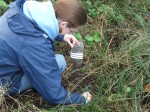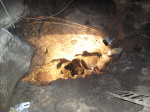Review of Caleb D. Spencer's “Working Knowledge: Faith, Vocation, and the Evidence of Things Unseen,” in Faithful is Successful. … [Read more...] about Giving Thanks: A Christian Approach to Vocation (Scholar’s Compass)
knowledge
A Biblical Basis for Secular Knowledge (Scholar’s Compass)
Reading Daniel 1 Reflection In an evangelical world in which “secular” knowledge is sometimes not valued, it's important to remember that the Bible itself, at least in a couple of instances, supports the learning and use of what's sometimes termed “secular” knowledge. Of course, there is no such thing as “secular” knowledge, really. There is simply knowledge, and God has all of the knowledge it's possible to have, including the “secular” and “sacred” kind. So, we really shouldn't have to defend the use of “secular” … [Read more...] about A Biblical Basis for Secular Knowledge (Scholar’s Compass)
Book Review: The Life of the Mind
The Life of the Mind: A Christian Perspective By Clifford WIlliams My rating: 4 of 5 stars “Our danger has not been too much thinking, but not enough.” –Nathan Hatch The epigraph to Williams book gives us the purpose of this book in a sentence: to make the argument for the importance of thinking and the life of the mind. Williams originally did this in pamphlet form, which has now been expanded into this still concise little book that gives us the contours of an argument for thinking. He begins by … [Read more...] about Book Review: The Life of the Mind
Navigating Knowledge: Integrating Faith and Palaeoecology (Scholar’s Compass)
‘And God blessed [mankind] and said to them, “Be fruitful and increase in number; fill the earth and subdue it. Rule over the fish in the sea and the birds in the sky and over every living creature that moves on the ground.” ’ The LORD God took the man and put him in the Garden of Eden to work it and take care of it.' Genesis 1:28, 2:15 (NIV) ‘For the creation waits in eager expectation for the children of God to be revealed. For the creation was subjected to frustration, not by its own choice, but by the will of the … [Read more...] about Navigating Knowledge: Integrating Faith and Palaeoecology (Scholar’s Compass)
Navigating Knowledge: Integrating Faith and Archaeology (Scholar’s Compass)
“By wisdom the LORD laid the earth's foundations, by understanding he set the heavens in place; by his knowledge the watery depths were divided, and the clouds let drop the dew.” Proverbs 3:19-20 (NIV) “See, I have chosen Bezalel son of Uri, the son of Hur, of the tribe of Judah, and I have filled him with the spirit of God, with wisdom, with understanding, with knowledge and with all kinds of skills – to make artistic designs for work in gold, silver and bronze, to cut and set stones, to work in … [Read more...] about Navigating Knowledge: Integrating Faith and Archaeology (Scholar’s Compass)




